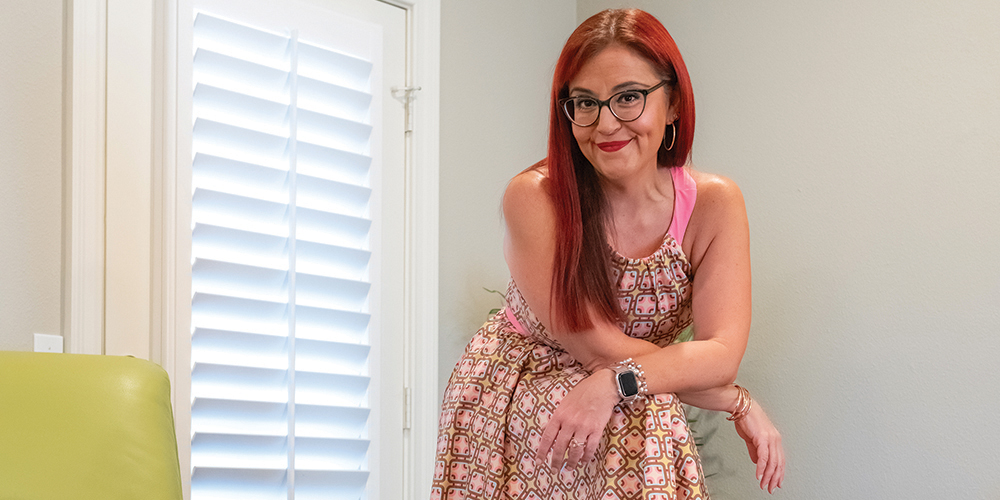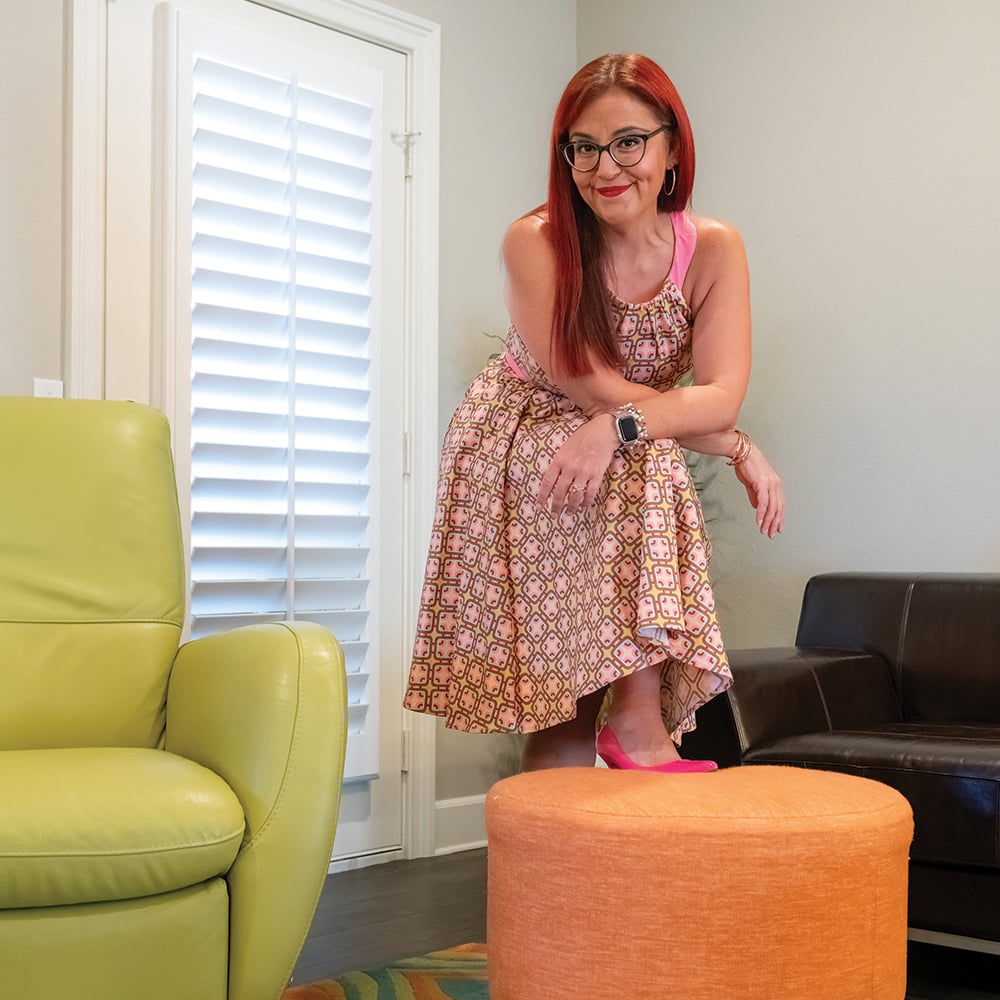
Can I Tell Them Who I Am?
After 17 years at PFLAG, Palm Springs resident — and Out & Equal’s new vice president of learning — knows all about diversity, equality, and inclusion in the workplace.
As seen in Issue 4 of DAP Health magazine
Words by Victoria Pelletier • Photos by David A. Lee
Jean-Marie Navetta’s bio at PFLAG ended with the quip, “Jean-Marie is, most importantly, living proof that philosophy majors can get real jobs.”
Of course, Navetta is far more than a “philosophy major.” Educator, advocate, leader, prophet, sage, dreamer, superwoman? Now we’re getting closer. Navetta’s illustrious career in the diversity, equity, and inclusion (DEI) space through LQBTQ+ education and advocacy points to her why in life. She envisions a world wherein no one needs to ask the question she’s often asked herself on the first day of a new job: “Can I tell them who I am?” For those committed to actualized DEI in business and beyond it, the universal answer must become, “Yes, you can!” And one must not lose any sleep over it.
I recently sat down for a Zoom interview with the Palm Springs resident as she prepared to take on a new professional role as vice president of learning at Out & Equal, “the premier organization working exclusively on LGBTQ+ workplace equality,” per the nonprofit’s website. “Through our worldwide programs, Fortune 500 partnerships, and our annual Workplace Summit conference, we help LGBTQ+ people thrive and support organizations creating a culture of belonging for all.”
Navigating Identity: Jean-Marie's Journey in DEI Advocacy
The biggest takeaways from our conversation? Inclusion begins with education, and full inclusion means changing systems and the culture. Navetta is deeply committed to all of the above. She reminds me — and all of us, for that matter — that changing systems and culture is especially daunting in the current, uber-polarized environment. “DEI work was a given,” Navetta notes as she looks back on her early pro years, adding that “opposition has become far more sophisticated in how they are resisting it; this level of sophistication should cause us to be concerned and be more vigilant and relentless in our work.”
Education as Empowerment: Transforming Workplace Culture
Bottom line? There’s plenty of work to do to overcome the regression that is afoot in government, business, and broader culture.
Navetta remembers the first time she encountered PFLAG. A teenager at the time, she observed a Pride parade from the sidelines and thought, “Wow…if only.” After earning that golden philosophy degree, Navetta considered law school for a while before settling into communications roles. Heart and mind stirred during those early years in the workplace. She recognized the forward momentum of the inclusion movement and knew she wanted to be a part of an unscripted future in DEI.
Challenges and Progress: Overcoming Obstacles in the DEI Movement
A work stint in Washington, D.C. provided the entry point for a career in her education and advocacy work. While working as a press secretary there, Navetta volunteered with a local PFLAG chapter. Impressed by her passion, intellect, and ability, the chapter director submitted her resume to PFLAG HQ, knowing Navetta’s drive and skills were needed at the national level. The pivot from communications to advocacy and education was now underway for Navetta, and would grow for the next 17 years with PFLAG.
Business as Catalyst: The Role of Corporations in Advancing LGBTQ+ Rights
“I had to find my space in the movement,” she says while reflecting on her early days in DEI, so she gobbled as much information as possible, taking deep dives into topics like butch/femme identity. Navetta had experienced, personally, that queerness could lead to discrimination and even hostility in the workplace. Like many in the LGBTQ+ community, she has been leery at times about “being out” in the office, and she understands that many workers remain confused by the difference between acceptance and full inclusion and belonging. “Look around,” she declares with a resolute voice. We need workplace advocacy because, “we’re losing ground on the policy and cultural acceptance fronts.”
Global Impact: Jean-Marie's Vision for DEI Education at Out & Equal
Of course, the current political climate does not help advance DEI efforts in education or in business. In the most sobering moments of our conversation, Navetta laments the insidious ways elected representatives stoke regressive legislative action. “Legislation is designed to shut discussions down, and it makes you realize we have to do more.” Pondering the impacts of her work as a DEI champion and guide for businesses, Navetta adds, “Restrictions on how we talk about things in education, government, in documents, etc. means that one of the last places we can have this conversation is in the workplace.”
Effective DEI work in the workplace can move the broader cultural conversation forward, though. “Look at marriage equality — there was phenomenal grassroots activism, yet the influence of private sector employers was incredibly powerful in driving change and judicial decisions forward.” Navetta sees business shaping many more DEI advancements. “Let’s use the time and place where people spend more time than anywhere else [work] to educate and advance LGBTQIA+ rights, inclusion.”
Citing court challenges to DEI based on religious freedom arguments, I ask Navetta if she thinks companies might reverse course on DEI progress because of recent legislation and court rulings. Despite the legislative and judicial headwinds, she feels positive about the prospects of businesses staying the course. “Most of the companies that we see committed will continue on their path forward; most companies understand that [DEI] helps with business performance.”
Indeed, Navetta’s new role at Out & Equal gives her the leverage to scale up her DEI educational work in a way that could have broad, global impact. Immediately, her leadership at the organization’s workplace summit — the world’s largest of the kind — will provide opportunities to present a diverse portfolio of LGBTQIA+ programs to a significant, cosmopolitan audience.
Our superwoman with the golden philosophy degree remains a global force in the DEI space. She feels supported by her wife of 23 years, Jude Medeiros, plus a cohort of generous colleagues. Then there’s the considerable quality of life she has found by moving from grey and chilly San Francisco to warm and sunny Palm Springs in 2018. The local international airport certainly makes her frequent travel less of a burden, and the community of friends the couple has cultivated recharges Navetta’s oft-depleted batteries come evening or the weekend. She’s even found time to volunteer to teach queer youth about their history at the LGBTQ Community Center of the Desert’s satellite space in Coachella.
Basically, Navetta believes she was born at the perfect time into a difficult world, buoyed by infinite possibilities. “I am excited to be educating LGBTQIA+ leaders and the next generation,” she offers with a look of satisfaction.
I, like many of you, look forward to the day Navetta’s question — Can I tell them who I am? — is always answered in the affirmative.









